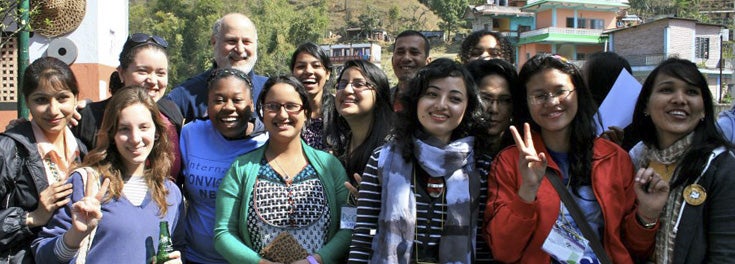
Thought about spring break yet? Maybe a little surfing somewhere where it is warmer? Rest and relaxation? Or how about a trip to Nepal to help an ancient culture resolve modern political conflict through nonviolent peace building?
That last one is exactly how eight URI students spent their spring break last March along with the URI Center for Nonviolence and Peace Studies. Oh sure, they visited historic Hindu and Buddhist temples and shrines, and rode elephants at the Chitwan National Park and Wildlife Refuge, and joined in the dancing during a wedding celebration in the street. But first and foremost, they were there for just the kind of experiential learning opportunities we like to give our students – the kind that imparts knowledge and skills at the very intersection of global change and social responsibility.
Surrounded by the natural beauty of Pokhara, a village on the shores of crystal-clear Phewa Lake and bordered by the snow-capped Annapurna Mountain Range, URI students majoring in everything from communicative disorders and film studies to pharmacy and business, participated in a joint peace and nonviolence training program with Nepali students from Tribhuvan University, members of a national network of peace and human rights organizations called the Collective Campaign for Peace, an organization of social workers committed to peace, and community volunteers. Their training focused on Kingian Nonviolence methodologies within the socio-political context of post-conflict Nepal.
Short history lesson: Located in the Himalayas, Nepal is bordered by the Tibetan regions of China and India. It was a monarchy until the 1990s when a people’s movement peacefully overthrew their ruler to establish a democratic government. A Maoist revolutionary group attempted to take power, and a decade of violence and civil war ensued until the fighting ended in 2008. A coalition was formed, and a constitutional assembly was elected, but attempts to write a constitution have been unsuccessful and a political stalemate has enveloped the country.
“While there’s an absence of violence in Nepal today, there is a fragile state of peace. People there are hungry to learn nonviolence alternatives for social change,” said URI psychology Professor Paul Bueno de Mesquita, who directs the Center for Nonviolence and Peace Studies and led the trip. “Our students were incredible trainers, and each brought a unique perspective to Nepal that contributed to an overall understanding to help carry Nepal forward,” Bueno de Mesquita said.
That’s right, we weren’t there just to learn, but to help, too. The international study and training program in Nepal is conducted by the URI Center for Nonviolence and Peace Studies faculty, assisted by URI students who have been certified as nonviolence trainers. As for the students who went through the training program, “instead of simply describing global problems, these students are better equipped to lead in the design of global solutions,” Bueno de Mesquita said.
Mike Petrarca ’12, who extended his trip an extra week to trek about the Himalayas, said, “Many opportunities, if taken, will change your life for the better. Not only did I gain an in-depth understanding of Nepal as a country and of nonviolence practices, but I also learned a great deal about myself.”
Oh sure, you could go surfing for spring break. But why do that, when you can change you life and others’?
Related Links:
Find out more about Spring Break 2013 in Nepal
Apply for Spring Break 2013 in Nepal
URI Office of International Education
QuadAngles story: A Peaceful Exchange in Nepal
